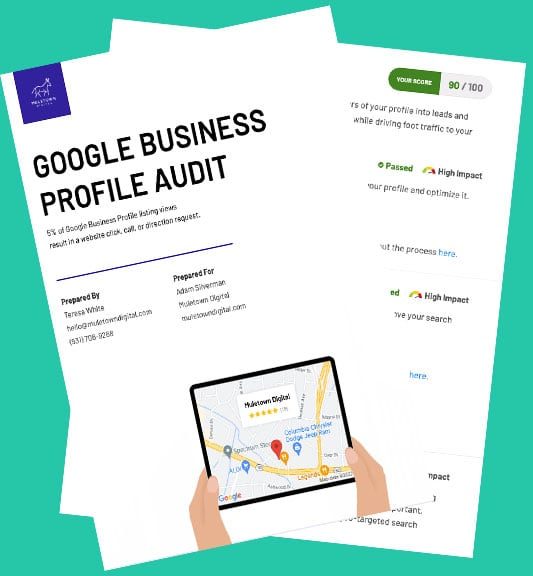Common SEO Mistakes Small Businesses Make: Avoid Them to Boost Rankings | Muletown Digital
Hey everybody, Adam Silverman here from Muletown Digital. Today, I want to talk about three major SEO mistakes that we consistently see from business owners—whether they’ve attempted SEO on their own or had work done by an agency.
If you’re new to SEO (Search Engine Optimization), it’s essentially the process of optimizing your website to be found by potential customers searching for your products or services online. SEO is a long-term game, and getting it right can make a massive difference in your business’s online visibility.
However, there are several key areas where businesses go wrong. Let’s break down the three most common SEO mistakes and how you can avoid them.
Understanding SEO Fundamentals
The Importance of a Strong SEO Foundation
A strong SEO foundation is crucial for any online business to succeed. It’s the backbone of a successful SEO strategy, and it’s essential to understand the fundamentals of SEO to avoid common mistakes. A solid SEO foundation includes a clear understanding of how search engines work, the importance of keyword research, and the role of high-quality content in driving search engine rankings.
Search engines use complex algorithms to determine the relevance and quality of web pages. By understanding these algorithms, businesses can optimize their websites to meet search engine criteria, improving their chances of ranking higher in search results. Keyword research is another critical component, as it helps identify the terms and phrases potential customers use. High-quality content, on the other hand, ensures that visitors find value in your site, encouraging longer visits and higher engagement rates.
How Fundamentals Influence SEO Success
Understanding SEO fundamentals is critical to achieving success in search engine optimization. By grasping the basics of SEO, businesses can create a solid foundation for their online presence, drive more traffic to their website, and increase their search engine rankings. A strong SEO foundation also helps businesses to avoid common SEO mistakes, such as keyword stuffing, duplicate content, and poor mobile optimization.
For instance, keyword stuffing—overloading a page with keywords—can lead to penalties from search engines, while duplicate content can confuse search engines and dilute the value of your pages. Poor mobile optimization can result in a subpar user experience, leading to higher bounce rates and lower rankings. By mastering the fundamentals, businesses can create a robust SEO strategy that avoids these pitfalls and sets the stage for long-term success.

Ignoring Keyword Research—or Doing Search Engine Optimization Incorrectly
One of the most common SEO mistakes we see is businesses skipping keyword research altogether, targeting the wrong keywords, or failing to understand search intent. Without comprehensive keyword research, your website may miss out on traffic and potential customers. Effective keyword research involves identifying the words and phrases your target audience uses when searching for products or services like yours, helping your site rank higher on search engine results pages (SERPs).
Why Keyword Research Matters
Keyword research helps you understand what potential customers are searching for and how they phrase their queries. Choosing the right keywords means aligning your website’s content with real-world searches, ensuring you show up when it matters most. It also allows you to identify niche opportunities and target long-tail keywords that have less competition but higher conversion rates.
A well-researched keyword strategy not only improves your search engine rankings but also enhances the quality of traffic your website receives. By focusing on the terms your audience uses, you attract visitors who are more likely to convert into paying customers. Furthermore, understanding seasonal trends and geographic differences in search behavior can give you a competitive edge, ultimately boosting your SEO efforts.
Common SEO Mistakes in Keyword Research
a) Targeting Low-Volume or Irrelevant Keywords
Many businesses optimize their home pages or key pages for terms that have little to no search volume. For example, a general contractor might optimize their homepage for “residential contractor” because that’s how they describe their business. However, if the keyword research shows that “general contractor near me” has thousands of searches while “residential contractor” has only 50, then they’re missing out on a massive opportunity. Additionally, using industry jargon that customers don’t search for can limit your website’s visibility. Using keywords that are too specific or brand-centric can limit your reach.
b) Not Considering Search Intent
Different keywords have different intents. Someone searching “best general contractor in Nashville” is likely ready to hire, while “how to become a general contractor” is an informational search. If your business targets people ready to make a purchase, you don’t want to optimize for keywords that attract visitors just looking for information. Understanding the four types of search intent—navigational, informational, transactional, and commercial—can help you create content that matches what users are looking for. Aligning your keywords with the correct intent ensures that you attract visitors who are more likely to engage with your content and take action.
c) Optimizing for Generic Terms
If you run a bakery, optimizing for the word “cake” isn’t helpful. Search engines will interpret that as too broad, returning results that may include bands, movies, or recipes instead of local bakeries. Instead, something like “custom birthday cakes Nashville” will drive more relevant traffic. Additionally, competing for generic keywords is often more difficult because of the high competition. Using long-tail keywords such as “gluten-free chocolate cake delivery Nashville” not only improves your ranking chances but also attracts users with specific needs, increasing conversion rates.
How to Fix It
- Use Google’s Keyword Planner or tools like Ahrefs, SEMrush, or Ubersuggest to research high-volume, relevant keywords. These tools can help you find keyword variations, related searches, and long-tail keywords that align with user intent. Use competitor analysis features to identify keywords your competitors rank for and find opportunities to differentiate your content. Additionally, Google Search Console can provide valuable data to refine your SEO strategies by identifying mobile responsiveness issues, tracking broken links, and monitoring overall site performance.
- Focus on long-tail keywords that match user intent. These keywords are more specific and often have higher conversion rates because they capture users who are further along in the buying process.
- Regularly revisit and update your keyword strategy to adapt to trends and competitor movements. Search behavior changes over time, and staying up-to-date ensures you continue to attract the right audience.
- Consider your target audience’s language and preferences when selecting keywords. Use tools like Answer the Public to find common questions and topics that your potential customers are interested in. Integrate keywords naturally within your content to avoid keyword stuffing, which can harm your SEO performance.
By understanding what your audience is searching for and optimizing your content to match those queries, you can improve your search engine rankings, attract more qualified leads, and increase your website’s visibility and conversions. Effective keyword research is an ongoing process that requires continuous monitoring and adjustment to stay competitive in the ever-changing digital landscape.

Technical SEO Essentials
Common Technical SEO Mistakes
Technical SEO is a critical aspect of search engine optimization, and it’s essential to avoid common technical SEO mistakes. Some of the most common technical SEO mistakes include:
- Slow website speed: A slow website can lead to high bounce rates and low search engine rankings. To avoid this, businesses should optimize their website’s loading speed by compressing images, minifying CSS and JavaScript files, and leveraging browser caching. Faster websites not only improve user experience but also signal to search engines that your site is efficient and reliable.
- Poor mobile optimization: Not optimizing for mobile devices can result in poor user experience and low search engine rankings. Businesses should ensure that their website is mobile-friendly and provides a seamless user experience across all devices. This includes using responsive design, optimizing images for mobile, and ensuring that buttons and links are easily clickable on smaller screens.
- Inadequate meta tags: Failing to use meta tags can make it difficult for search engines to understand content. Businesses should use meta tags, such as title tags and meta descriptions, to provide search engines with a clear understanding of their content. Well-crafted meta descriptions can also improve click-through rates by giving users a preview of what to expect on your page.
- Lack of internal linking: Not linking to other relevant pages can make it hard for search engines to crawl the site. Businesses should use internal linking to help search engines understand the structure of their website and to drive more traffic to their pages. Internal links also help distribute page authority throughout your site, improving the ranking potential of individual pages.
By avoiding these common technical SEO mistakes, businesses can improve their search engine rankings, drive more traffic to their website, and increase their online visibility. Ensuring that your website is technically sound is a foundational step in any successful SEO strategy, helping you to build a site that is both user-friendly and search engine-friendly.

Poor Content Strategy & User Experience
Even if your keyword research and technical SEO are perfect, your website still won’t rank if your content and user experience are lacking. High-quality content combined with a smooth user experience is essential for keeping visitors engaged and encouraging them to take action. Content should not only attract users but also answer their questions, provide solutions, and guide them through your site.
a) Publishing Low-Quality Content
Content is king, but only if it’s valuable, original, and well-structured. Many businesses make the mistake of stuffing keywords into pages without adding real value to the reader. Google can detect this and will penalize poor content. Valuable content should be well-researched, offer actionable insights, and address the needs of your target audience. Avoid duplicate content and ensure that each page serves a unique purpose.
Fix it by:
- Writing engaging, in-depth, and original content.
- Using proper headings (H1, H2, H3) and structuring content for readability.
b) Not Mobile-Friendly
Over 60% of website traffic now comes from mobile devices. If your site isn’t optimized for mobile, you’re losing visitors and rankings. The mobile-friendly design ensures that users can easily navigate your site, read your content, and interact with your pages on any device.
Fix it by:
- Using Google’s Mobile-Friendly Test.
- Implementing a responsive design that adjusts to all screen sizes.
c) Ignoring User Engagement Signals
Google tracks metrics like bounce rate, time on site, and click-through rates. If users leave your site quickly, it signals to Google that your page isn’t relevant. Improving engagement involves making your content more interactive, using clear calls-to-action (CTAs), and ensuring that navigation is intuitive and straightforward.
Fix it by:
- Making your site easy to navigate.
- Keeping paragraphs short and using bullet points for readability.
- Adding compelling CTAs (Call-to-Actions).

Conclusion: SEO is a Long-Term Investment
Many business owners make the mistake of ignoring SEO until they suddenly need it. But SEO is like building wealth—it takes time, consistency, and strategic effort. Waiting until your rankings have plummeted or your competitors have overtaken you makes the recovery process much harder and more expensive. Building a strong SEO foundation ensures that your website continues to attract organic traffic, generate leads, and support your long-term business goals. SEO is an ongoing process that requires attention, adaptability, and a commitment to delivering value to your audience.
How to Stay Ahead:
- Regularly update your keyword strategy.
- Fix technical SEO issues before they impact rankings.
- Create valuable, engaging content.
- Ensure a seamless, user-friendly experience.
- Monitor analytics and adjust accordingly.
Ignoring SEO is like not saving for retirement—it might not seem urgent now, but the consequences will catch up with you. Without consistent SEO efforts, your website may fall behind competitors, lose visibility in search results, and miss out on valuable traffic and leads. Don’t wait until it’s too late—take proactive steps today to strengthen your online presence, drive sustainable growth, and future-proof your business.
🚀 Need help with your SEO? Contact Muletown Digital today to get started!
Are you struggling to generate leads off of your website?
Ready to turn SEO challenges into opportunities? At Muletown Digital, we know that every missed keyword and technical glitch can hold back your growth. Let our expert team help you fine-tune your strategy—from targeted keyword research to flawless site performance and engaging content that converts. Invest in your online future today and contact us to unlock your website’s full potential.
Other Helpful Digital Marketing Insights
© Copyright 2025 Muletown Digital, LLC. All Rights Reserved.

